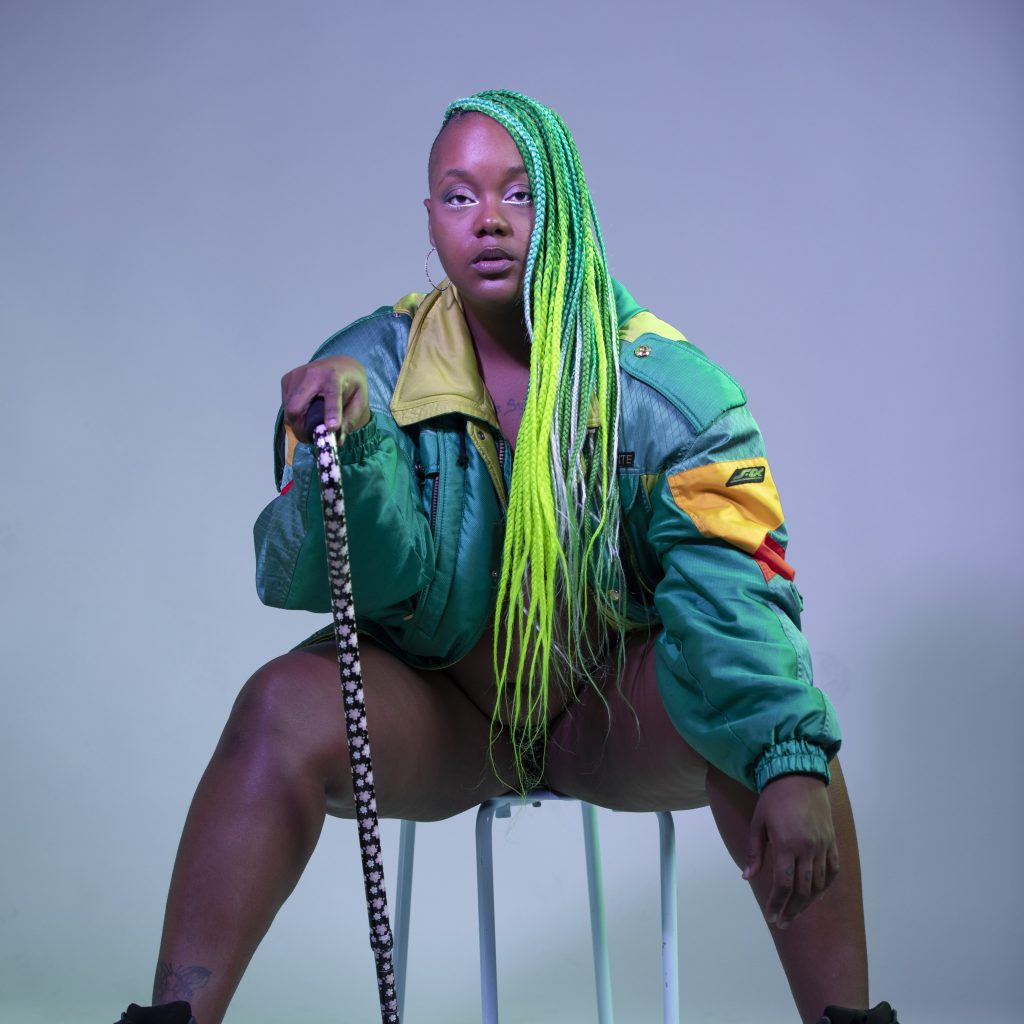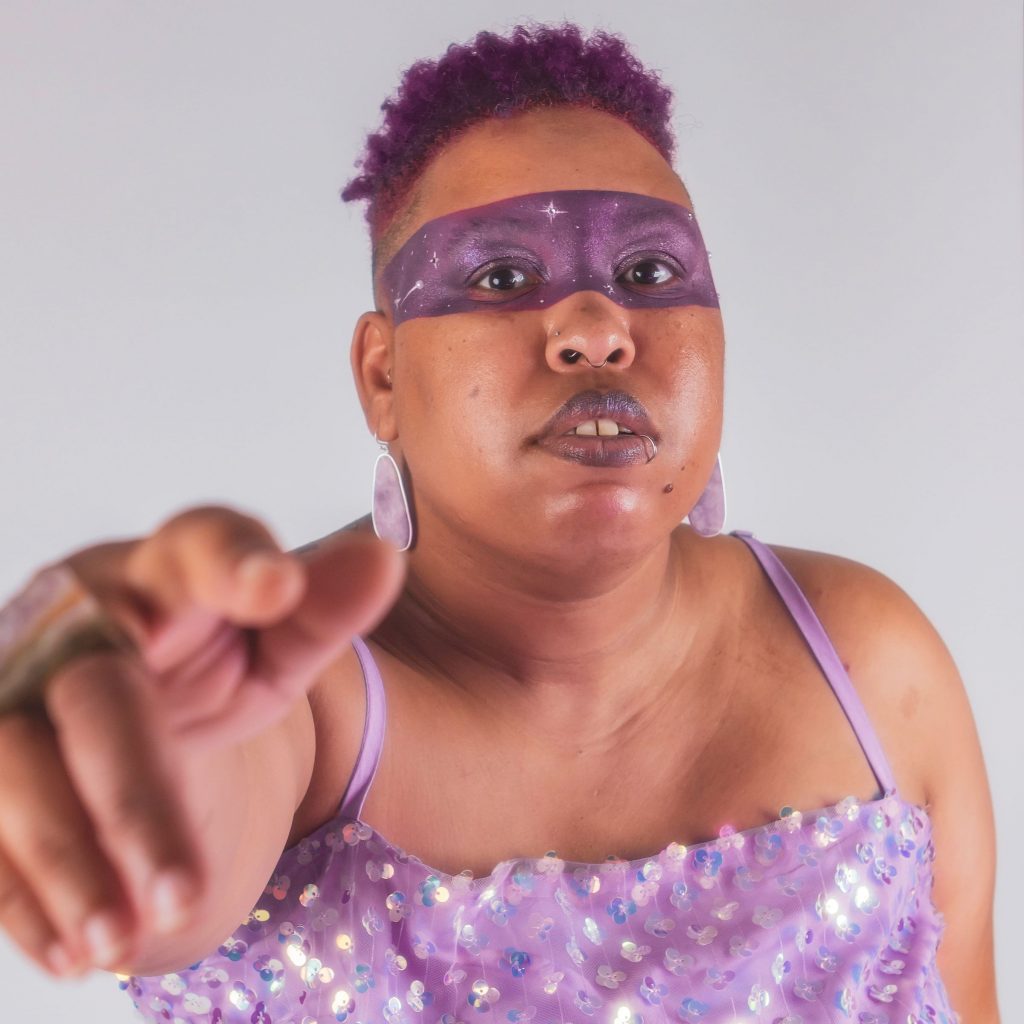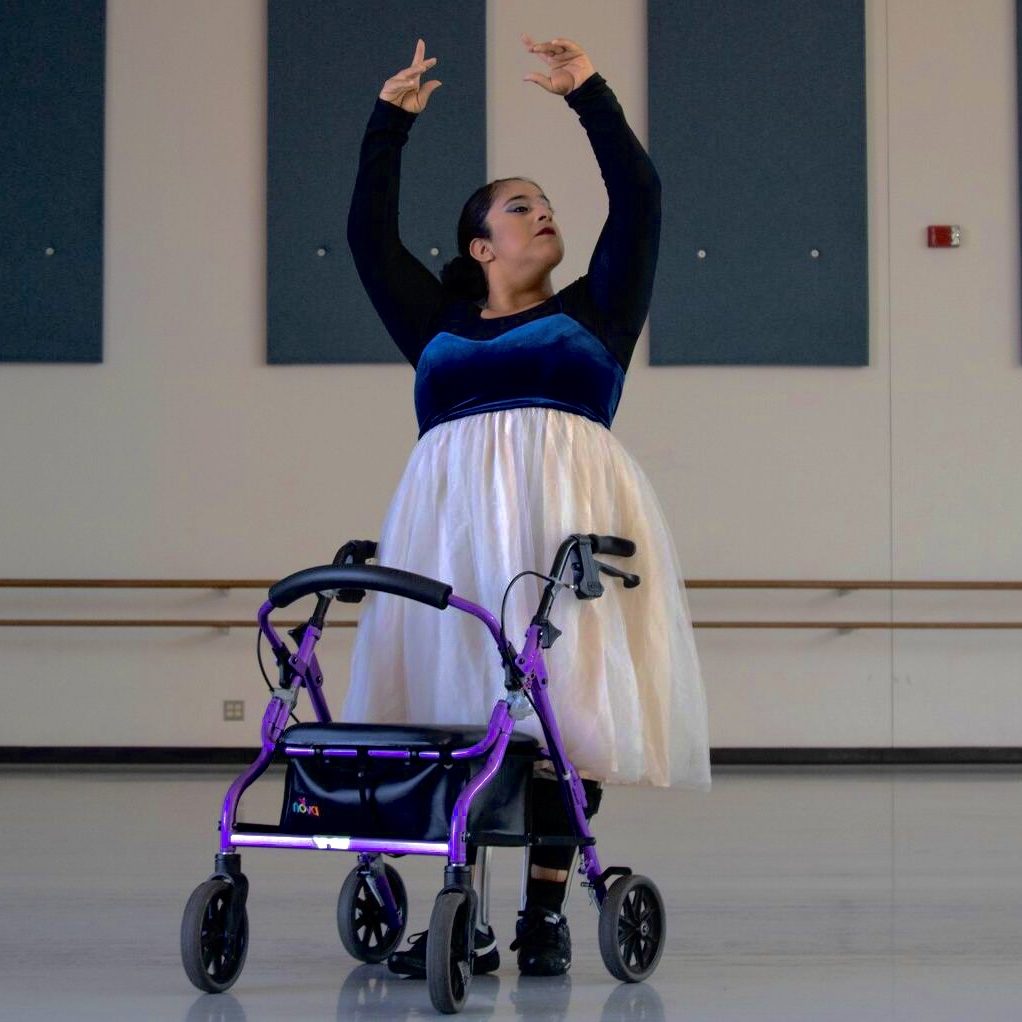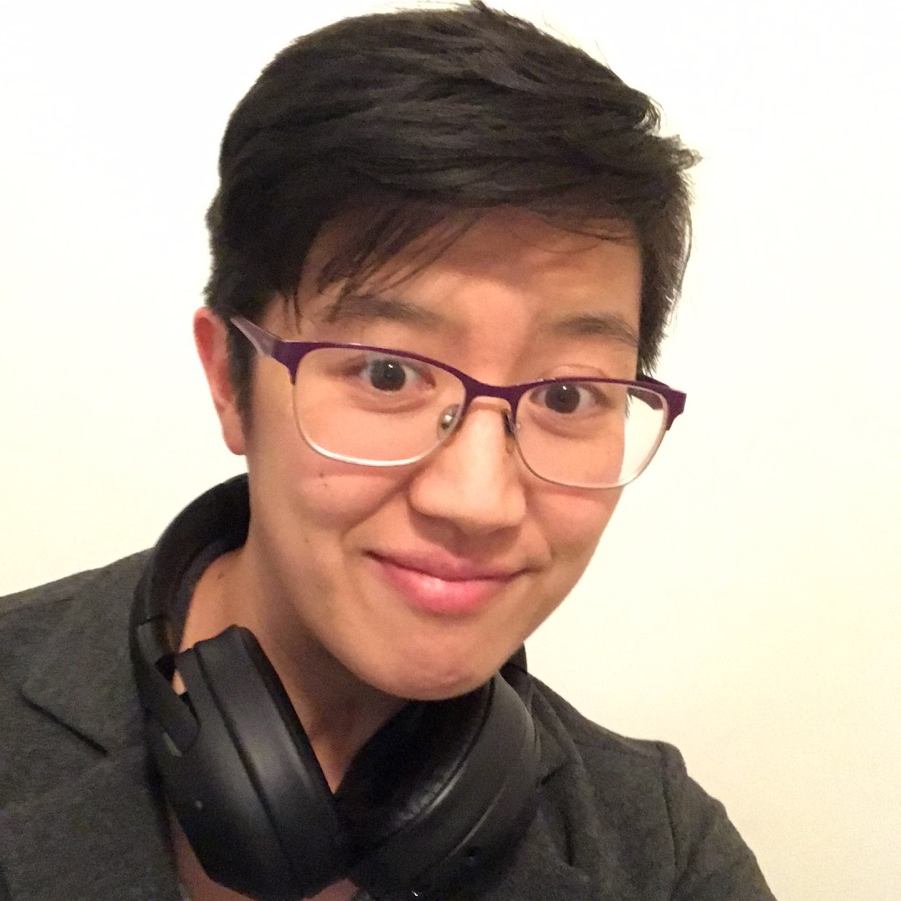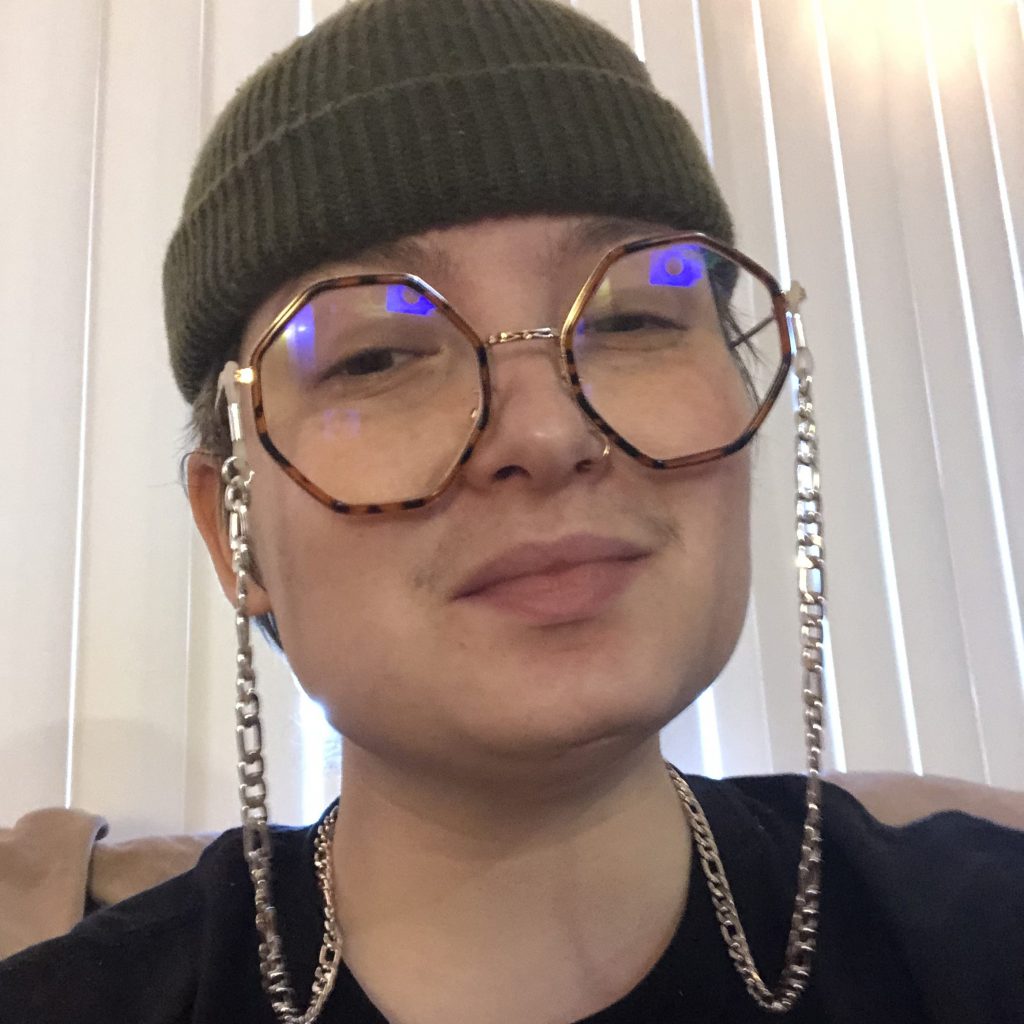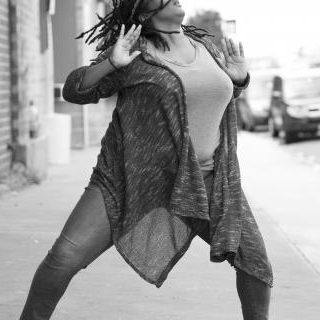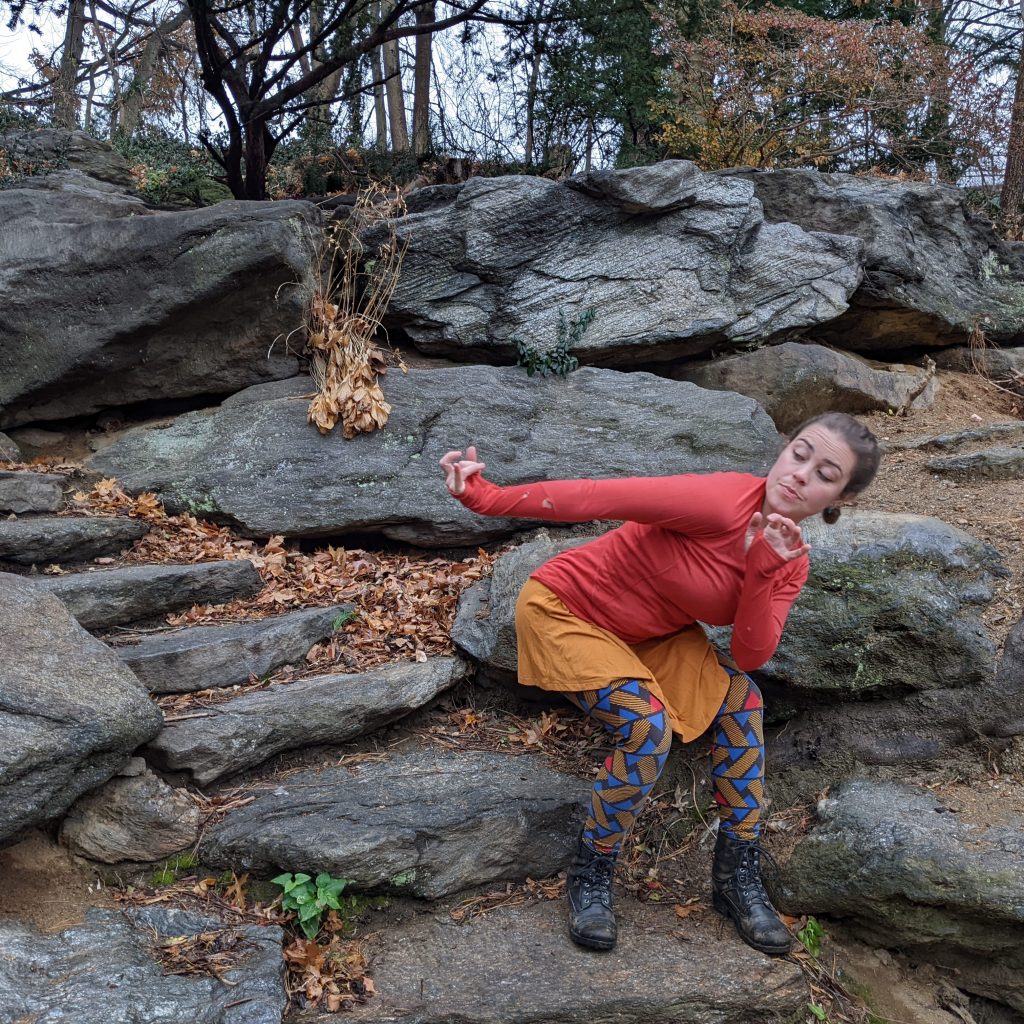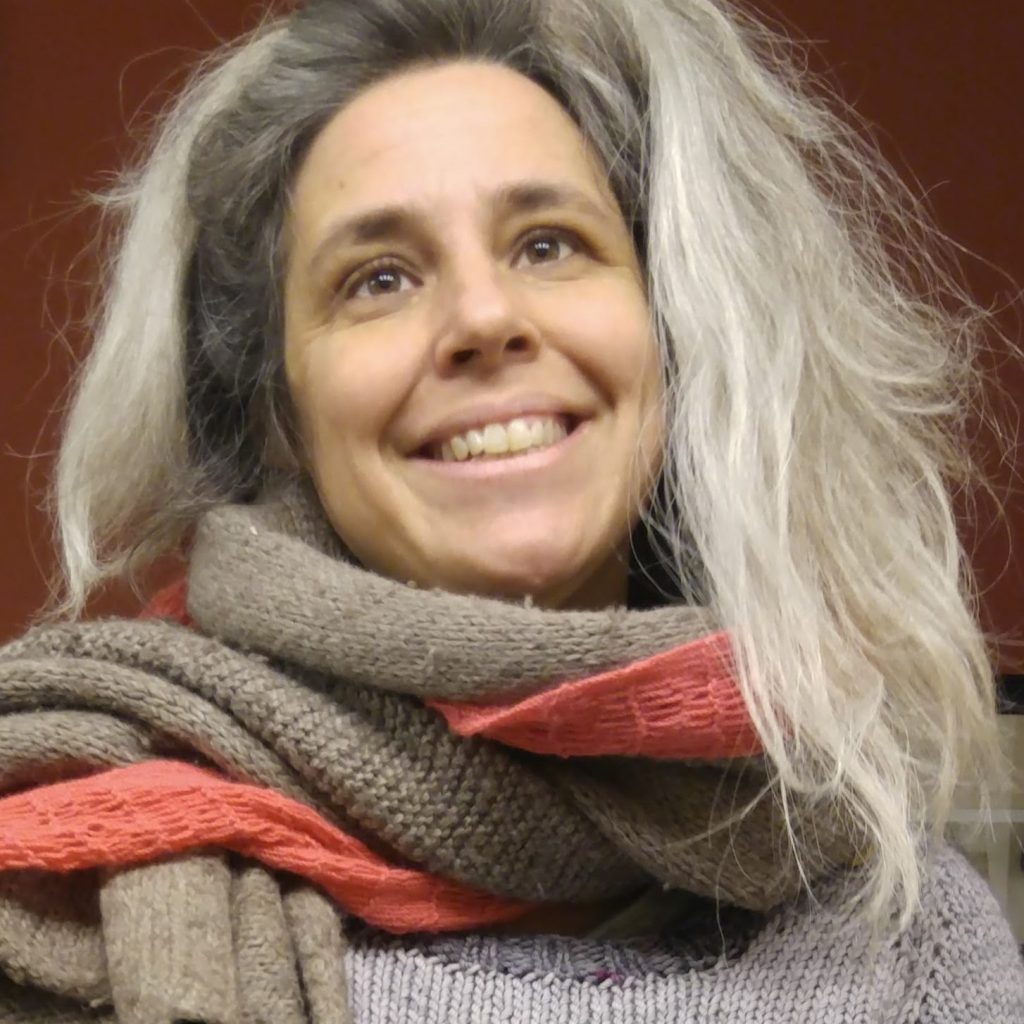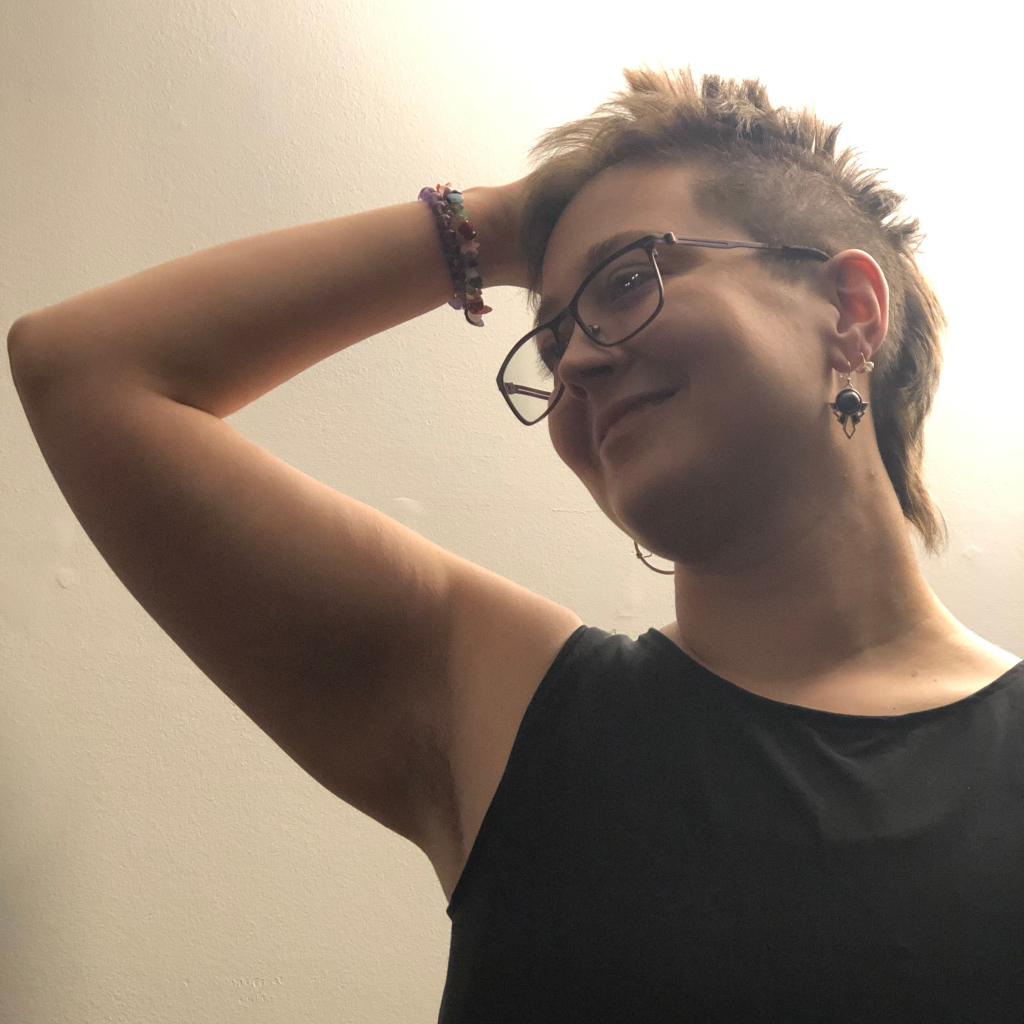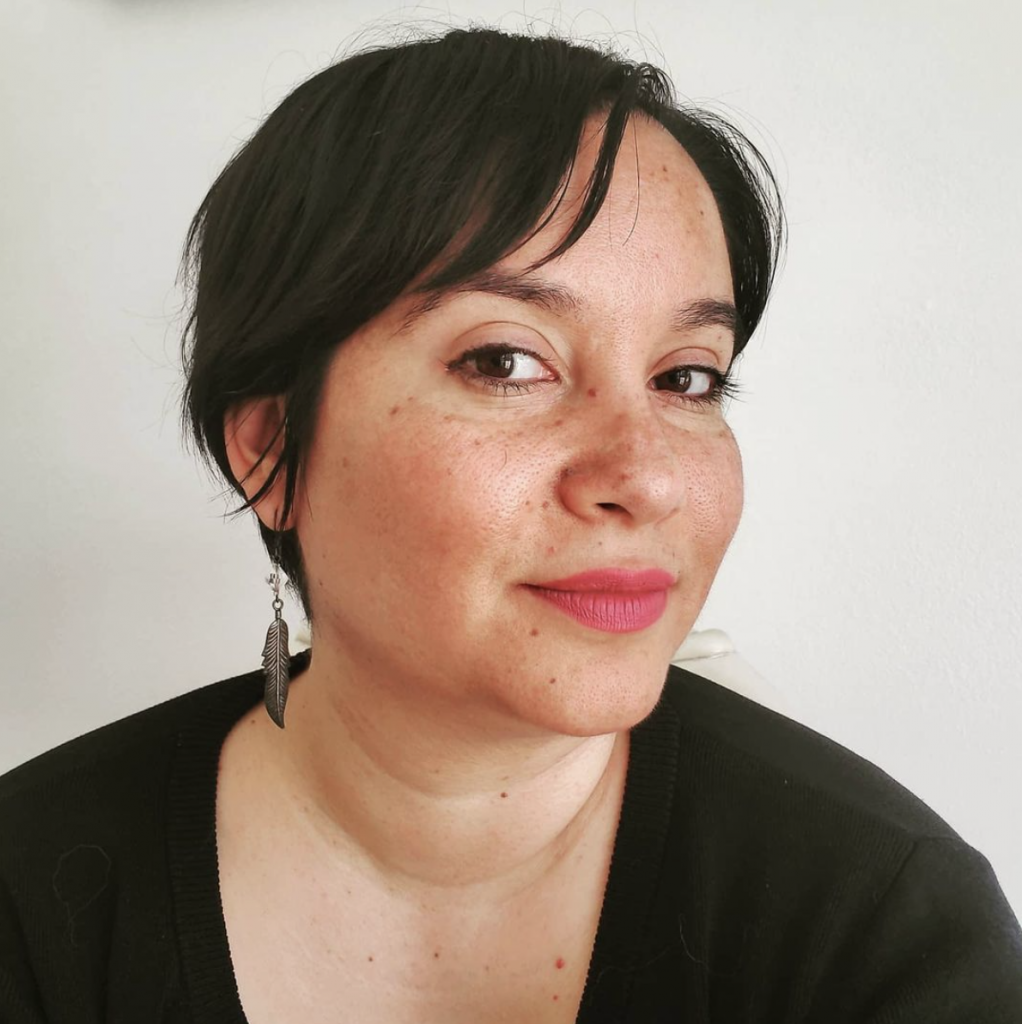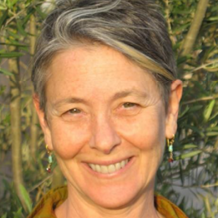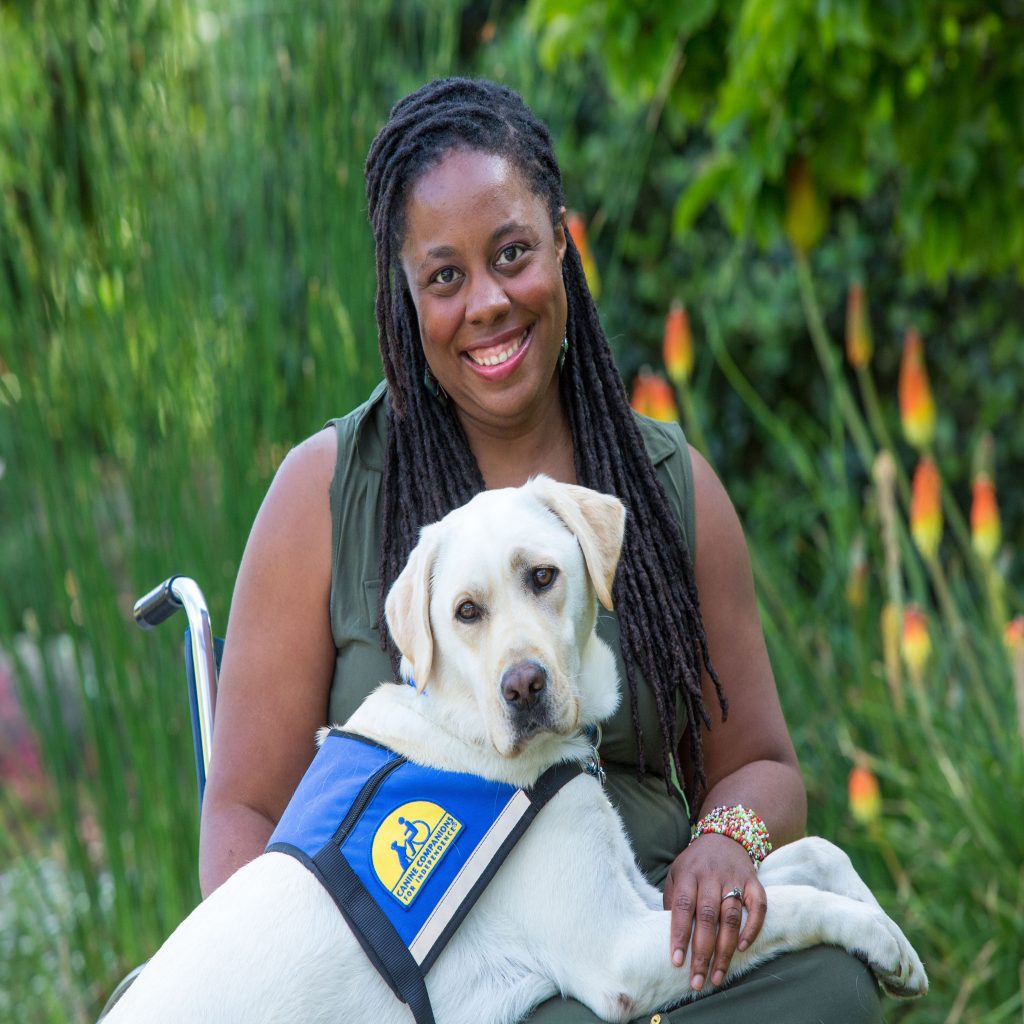2022 Cohort
Participants
Saira Barbaric
Saira Barbaric (they. he. she. ze.) is a multidisciplinary, gender-blending hedonist creature in a thicc Black human suit. Saira graduated from The Theatre School at DePaul with BFA in costume design. Since 2015, he/she has been based in Seattle creating performance, films, events and visual art that explore mythology, eroticism, Afro Psychedelic dreams, ritual objects and glitch aesthetics. Saira’s work has shown in over fifteen cities around North America and five in Europe.
Saira sits with their cane out to the side in a green puffy jacket and platform grey sneakers. Saira has warm brown skin and long green braids. Photo taken by Helen Moga in 2019.
Dominic Bradley
Dominic Cinnamon Bradley (The Johns Hopkins University BA | Columbia University MSW) is a Brooklyn-based Black, disabled, non-binary artist reared in the crunk-era “Dirty South.”
Dominic (pictured) is a Black person with short, purple hair wearing galaxy-themed makeup, dangly purple earrings, and several facial piercings. Dominic is clothed in a purple-sequined spaghetti strap dress. One of their arms is outstretched towards the camera.
Vanessa Cruz
Vanessa Hernández Cruz (she, her, hers) is an emerging Chicana disabled dance artist & Disability Justice activist. She is from the unceded lands of the Tongva & Kizh lands colonially known as Los Angeles, California. She graduated from California State University Long Beach with her Bachelor of Arts in Dance Science.
Through her dance films and choreographic work, Vanessa presents the audience with thought-provoking pieces that ignite the imagination and explores disability aesthetics in contemporary forms and experimentation. She is shifting the dance field away from the inspirational-porn perspective of disability and moving it into a humanistic perspective.
[Image Description: a colored photo of Vanessa standing in behind her walker named Pluto. The dance room has grey Marley floor with white walls that has large green panels. She is in ballet first position and arms are in 5th en bas. She is gazing upwards to the side. She has her hair pulled back into a ballet bun and is wearing light makeup.She is wearing a beautiful tulle dance dress. The top is velvet blue and the tulle skirt is a creamy soft beige color.]
Mel Chua
Mel Chua is a contagiously enthusiastic hacker, scholar, engineer, teacher, and perpetual motion machine who channels energy into many forms, dance among them. Mel was one of the participants in the 2019 Dancing Disability Lab, and is thrilled to be back for more. Mel is also an auditory low-pass filter and multimodal polyglot studying learning in hacker/maker communities, embodied qualitative research methodologies, and prototyping alternate ontologies of curricular culture in engineering education.
Mel gazes earnestly into towards the viewer through a pair of purple-rimmed glasses, with black hair cut short and swept back. A pair of headphones dangles from Mel’s neck, framing a grey blazer and t-shirt.
Rafi Darrow
Rafi is a queer, trans, multiply-disabled, white, Jewish femme. They are passionate about making the arts accessible to disabled people, and facilitating solidarity between all of the chronically ill, neurodivergent, and mobility- and sensory-disabled communities they are a part of. A 2015 Fulbright fellow and illustrator for Sins Invalid, they believe in plants, sex worker justice, anti-Zionism, and the joy and intimacy of inter/intra-disability identification.
White person with dark green hat cocks their head and smiles, with hexagonal glasses and glasses chains on a white background.
Kayla Hamilton
Artist Participant and Facilitator
Kayla Hamilton (she/her) is an artist, experience creator and educator based in The Bronx, NY. She is a member of the 2017 Bessie-award winning collective of skeleton architecture, the future of our world’s, curated by Eva Yaa Asantewaa. In addition to skeleton architecture, Kayla has been in process with Gesel Mason Performance Projects, Sydnie L. Mosley Dances, and Maria Bauman Morales/MBDance. Kayla’s creative explorations have been presented at Gibney, Performance Space New York and New Live Arts.When Kayla is not dancing, she’s a special education teacher at the Highbridge Green School who loves to watch Law and Order on Hulu while sipping on peppermint tea.
A black and white image of Kayla Hamilton, a Black woman with shoulder length locs, throws her head back with the palms of her hands facing outward near her shoulders. Her legs are wide and slightly bent. She is wearing blue jeans and a knee length cardigan that wraps around her thighs. Behind her are storefronts and cars parked on the street. Photo by Travis Magee.
Alison Kopit
Alison Kopit (she/her) is a queer autistic cultural worker, performance artist, and access strategist based on Lenape Land, colonially known as Philadelphia. She is passionate about the liberatory potential of disability aesthetics, anti-oppressive approaches to cultural work, time travel, and crip care. She was a resident of Dance/NYC’s Disability. Dance. Artistry program, research coordinator for Simi Linton’s Proclaiming Disability Arts project, scholar-in-residence to Full Radius Dance, art administrator to Sky Cubacub of Rebirth Garments, and visiting assistant professor of Disability Studies at the University of Toledo. She recently earned her PhD from the University of Illinois at Chicago in Disability Studies.
Alison, a white femme, crouches on a stone staircase with large boulders on each side. Her right arm extends out to the side with wrist bent, fingers angled skyward. She gazes at her outstretched arm. Her other arm is bent, with hand gently curled below her chin. Her brown hair is tied back. She wears a red shirt over a light orange skirt with colorful patterned leggings and black boots.
Photo credit: Aster Harrison
Karen Krolak
Karen Krolak is a free range collaborator living with a rare chronic health condition on the unceded lands of the Massachusett and Pawtucket now called Malden, MA. She is the co-Artistic Director of Monkeyhouse, an award winning nonprofit that connects communities to choreography. Her Dictionary of Negative Space holds space for unnamed ideas related to grief, trauma and repair and was inspired by her experiences after a car crash killed her mother, father & brother. It has been featured in national/international exhibitions and performances with Monkeyhouse, Nicole Harris, and Scott McPheeters.
Head shot of a pale woman with welcoming smile, lively eyes, and rambunctious long gray hair. She is enveloped in layers of hand knits.
Jen Roy
Jen Roy is a multiply disabled, queer and trans multidisciplinary artist, and community worker. They work in the overlaps of dance, circus, disability consulting, and mobility technology. They are interested in the ways technology is used to build bodyminds by disabled people, what influences those bodies and minds within the pressures of an ableist, capitalist, and white supremacist society (and how to resist). They question who has access to the ability to build and/or resist, given these and other oppressive structures.
Jen has trained with companies including Full Radius Dance, Kaeja D’Dance and REAson D’Etre Dance Productions.
A headshot of Jen, smiling casually while running one hand through their hair. They are a white multigender human with a shot brown mullet, purple metallic glasses, and mismatched jewelry. Light illuminates them from above against a plain white wall. Photo Credit: Jen Roy, 2021. Hair credit: Alex Grey./end ID
Project Leads
Shayda Kafai
Writer-in-Residence
Shayda Kafai (she/her) is an Assistant Professor of Gender and Sexuality Studies in the Ethnic and Women’s Studies department at California State Polytechnic University, Pomona. As a queer, disabled, Mad femme of color, she commits to practicing the many ways we can reclaim our bodyminds from systems of oppression. To support this work as an educator-scholar, Shayda applies disability justice and collective care practices in the spaces she cultivates. Shayda’s writing and speaking presentations focus on intersectional body politics, particularly on how bodies are constructed and how they hold the capacity for rebellion.
An Iranian femme wears bright pink lipstick. She smiles at the camera. She has short, whispy hair, a long silver feather earring, and she is wearing a black shirt.
Victoria Marks
Choreographer-in-Residence
Victoria Marks, an Alpert Award-winning Choreographer, Guggenheim and Rauschenberg Fellow, and Fulbright Distinguished Scholar, has been practicing knowing and unknowing, making dances for stage and film, for the past 40 years. Victoria’s creative work migrates between “choreo-portraits” and “action conversations” for individuals who don’t identify as dancers, and dances for and with dancers that fuel her inquiries into movement. Marks’ work has continuously challenged conventional notions of virtuosity and embraced an expansive view of dancing bodies. Victoria serves as the Chair of UCLA’s Disability Studies minor, and is a professor in the Department of World Arts and Cultures/Dance. In addition to founding the Dancing Disability Lab at UCLA, her recent work includes “Ten Questions: If not now, when?” a course and public event that brings together three outstanding members of UCLA’s community from the arts, the humanities, and the sciences to address questions crucial to this contemporary moment. Some of the most recent questions included: How do we remember? How do we heal? How do we love?
A sunlit, outdoor headshot of a smiling white woman with short greying hair in front of green foliage.
India Harville, Embraced Body
DEIA Consultant
India Harville (she/her), MA, is the founder of Embraced Body. She is a Disability Justice activist/DEI consultant, politicized healer and performance artist. She identifies as African-American, femme, queer, and disabled; these identities deeply inform her work. The unifying theme in India’s work is centering body-based healing as a vehicle for personal/collective growth and transformation. Her work prioritizes reclaiming the body as an often underestimated pathway to decolonizing ourselves in order to deepen our embodiment of social justice, equity, and inclusion principles. India earned her Bachelor of Arts in Psychology at the New College of Florida and her Master of Arts in Integrative Health Studies at the California Institute of Integral Studies. You can learn more about her work at www.embracedbody.com.
A Black woman in a wheelchair smiles while embracing a white service dog in front of a green background of foliage.
Ryan Rockmore
Global Education Advisor, Chapman University
Ryan Rockmore is an L.A.-based flamenco performer, justice and equity practitioner, dance researcher, and global education administrator. He currently works at Chapman University as a Global Education Advisor, after completing PhD coursework at UCLA in Culture & Performance (2019-2021). Prior to his move to L.A., he worked for 5 years as a high school Spanish teacher, DEI coordinator, and student life professional. His scholarly work addresses sound across various movement practices, while his research-based and embodied artistic practice focuses on queerness and gender in flamenco dance. Rockmore has also conducted research in Spain as a Fulbright grantee, completed a Master’s in Dance Anthropology from Roehampton University, and received funding from the Jerome Foundation as well as residencies with Flamenco Vivo Carlota Santana. As co-founder and artistic director of Al Margen Flamenco, he continues to direct and perform in evening-length flamenco shows with his company in New York City.
Ryan, a white man with a beard and buzzed hair, gazes at the camera over his shoulder against a muted background.
